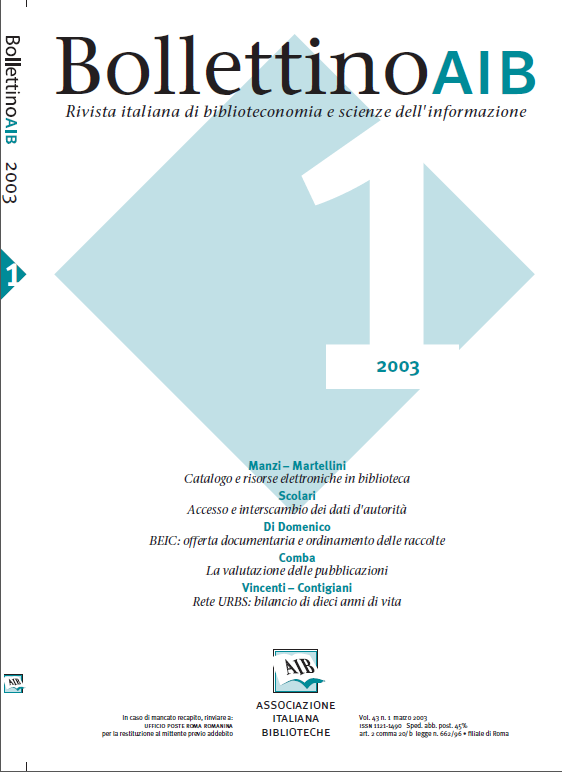From authority control to access and exchange of authority information
Main Article Content
Abstract
In 2001 IFLA published three documents, which will be the theoretical and applicative basis of authority control for the coming years: the second editions of GARE and UNIMARC/A and the report Structures of corporate name headings. The common point of departure at the base of these documents is the conviction, matured in recent years, that it is necessary to abandon the concept of a sole universal form of authority, «which means that the focus shifted to the promotion of international sharing» of authority registrations. In an international context therefore the connection between different authorised (national) forms is considered pre-eminent with respect to achieving universal uniformity.
Both the Principles of Paris and the UBC considered of primary importance the use of a sole uniform heading established by the national bibliographic agency and valid at international level. This was for reasons of authority control and cooperation. However this principle met immense obstacles in its practical application because of the different national traditions. For the headings of corporations especially, the FSCH recommendation of 1980 suffered the effects of national customs and unanimity was not achieved even within the group that cared for its publishing. Various attempts were made during the '90s to revise the FSCH until, in 1998, the project was abandoned. In this way the facts confirmed a weakening of the principle of collocation stated in the Principles of Paris, the validity of which is now limited to national level.
This changed trend is borne in mind by recent documents such as MLAR, published in 1998, and Structures of corporate name headings, which also represents a first attempt to verify up to what point a collection can be referred to a recovery of the information in the network.
The revision of GARR also feels the effects of this new situation, even in its refusal to propose a uniform representation of the punctuation in the examples, which are proposed according to the different national customs: this choice demonstrates the impossibility of achieving an international agreement even on these formal aspects. Moreover the concept of uniform headings disappears to be replaced by that of authorised headings, and the concept of parallel headings is radically altered.
UNIMARC/A which represents the "applicative" side of the international reflection on the problems of authority control, offers a new series of labels invented for facilitating international exchange: new are some labels of the 1.. area, which contain a set of data that enriches the traditional concept of authority registration and that could become important for the management of a widespread virtual authority archive. The analysis dedicated to the creation of authority records of different alphabets is of great importance. In this aspect UNIMARC is quite close to MARC21.
It will be possible to verify the validity and the limits of these IFLA documents in the near future, because the functionalities and ways of management of the VIAF (Virtual International Authority File) are already being analysed. Such an instrument could transcend the library situation and become an important contribution of the libraries and institutions which preserve the cultural memory in the "semantic Web".
Both the Principles of Paris and the UBC considered of primary importance the use of a sole uniform heading established by the national bibliographic agency and valid at international level. This was for reasons of authority control and cooperation. However this principle met immense obstacles in its practical application because of the different national traditions. For the headings of corporations especially, the FSCH recommendation of 1980 suffered the effects of national customs and unanimity was not achieved even within the group that cared for its publishing. Various attempts were made during the '90s to revise the FSCH until, in 1998, the project was abandoned. In this way the facts confirmed a weakening of the principle of collocation stated in the Principles of Paris, the validity of which is now limited to national level.
This changed trend is borne in mind by recent documents such as MLAR, published in 1998, and Structures of corporate name headings, which also represents a first attempt to verify up to what point a collection can be referred to a recovery of the information in the network.
The revision of GARR also feels the effects of this new situation, even in its refusal to propose a uniform representation of the punctuation in the examples, which are proposed according to the different national customs: this choice demonstrates the impossibility of achieving an international agreement even on these formal aspects. Moreover the concept of uniform headings disappears to be replaced by that of authorised headings, and the concept of parallel headings is radically altered.
UNIMARC/A which represents the "applicative" side of the international reflection on the problems of authority control, offers a new series of labels invented for facilitating international exchange: new are some labels of the 1.. area, which contain a set of data that enriches the traditional concept of authority registration and that could become important for the management of a widespread virtual authority archive. The analysis dedicated to the creation of authority records of different alphabets is of great importance. In this aspect UNIMARC is quite close to MARC21.
It will be possible to verify the validity and the limits of these IFLA documents in the near future, because the functionalities and ways of management of the VIAF (Virtual International Authority File) are already being analysed. Such an instrument could transcend the library situation and become an important contribution of the libraries and institutions which preserve the cultural memory in the "semantic Web".
Article Details
Section
Articles

This work is licensed under a Creative Commons Attribution-ShareAlike 4.0 International License.
